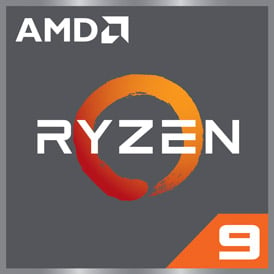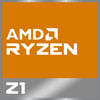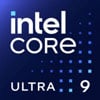AMD Ryzen 9 3900X Benchmark, Test and specs
Last updated:
The AMD Ryzen 9 3900X was released in Q3/2019 and has 12 cores. The processor can process 24 threads simultaneously and uses a mainboard with the socket AM4 (PGA 1331). In the Geekbench 5 benchmark, the AMD Ryzen 9 3900X achieved a result of 1,300 points (single-core) or 12,454 points (multi-core).

| Name: | AMD Ryzen 9 3900X |
|---|---|
| Family: | AMD Ryzen 9 (35) |
| CPU group: | AMD Ryzen 3000 (15) |
| Architecture: | Matisse (Zen 2) |
| Segment: | Desktop / Server |
| Generation: | 3 |
| Predecessor: | -- |
| Successor: | AMD Ryzen 9 5900X |
CPU Cores and Base Frequency
The AMD Ryzen 9 3900X has 12 cores. The clock frequency of the AMD Ryzen 9 3900X is 3.80 GHz (4.60 GHz). An initial performance assessment can be made using the number of CPU cores.
| CPU Cores / Threads: | 12 / 24 |
|---|---|
| Core architecture: | normal |
| Cores: | 12x |
| Hyperthreading / SMT: | Yes |
|---|---|
| Overclocking: | Yes |
| Frequency: | 3.80 GHz |
| Turbo Frequency (1 Core): | 4.60 GHz |
| Turbo Frequency (12 Cores): | 4.00 GHz |
Memory & PCIeThe AMD Ryzen 9 3900X supports a maximum of 128 GB memory. Depending on the mainboard, the processor can use a maximum of 2 (Dual Channel) memory channels. This results in a maximum bandwidth of the main memory of 51.2 GB/s. |
|
| Memory type: | Memory bandwidth: |
|---|---|
| DDR4-3200 | 51.2 GB/s |
| Max. Memory: | 128 GB |
| Memory channels: | 2 (Dual Channel) |
| ECC: | Yes |
| PCIe: | 4.0 x 20 |
| PCIe Bandwidth: | 39.4 GB/s |
Thermal ManagementThe AMD Ryzen 9 3900X has a TDP of 105 W. Based on the TDP, the system manufacturer can and must adapt the cooling solution to the processor. |
|
|---|---|
| TDP (PL1 / PBP): | 105 W |
| TDP (PL2): | 142 W |
| TDP up: | -- |
| TDP down: | -- |
| Tjunction max.: | 95 °C |
Technical details
Modern production reduces the waste heat of a processor and increases its efficiency. The AMD Ryzen 9 3900X is made in 7 nm and has 70.00 MB cache.
| Technology: | 7 nm |
|---|---|
| Chip design: | Chiplet |
| Socket: | AM4 (PGA 1331) |
| L2-Cache: | 6.00 MB |
| L3-Cache: | 64.00 MB |
| AES-NI: | Yes |
| Operating systems: | Windows 10, Windows 11, Linux |
| Virtualization: | AMD-V, SVM |
|---|---|
| Instruction set (ISA): | x86-64 (64 bit) |
| ISA extensions: | SSE4a, SSE4.1, SSE4.2, AVX2, FMA3 |
| Release date: | Q3/2019 |
| Release price: | 485 $ |
| Part Number: | -- |
| Documents: | Technical data sheet |
Rate this processor
Benchmark results

The benchmark results for the AMD Ryzen 9 3900X have been carefully checked by us. We only publish benchmark results that have been created by us or that have been submitted by a visitor and then checked by a team member. All results are based on and fullfill our benchmark guidelines.
Screenshots:
Screenshots:
- Cinebench R20 on Custom workstation (ASUS ROG Strix B550-F Gaming, 64GB DDR4-3600), Windows 10
- AIDA64 Cache & Memory Benchmark on Custom workstation (ASUS ROG Strix B550-F Gaming, 64GB DDR4-3600), Windows 10
- Geekbench 5.4.1 on Custom computer (ASUS ROG Strix B550-F Gaming, 32GB DDR4-3600), Windows 10
- Cinebench R23 on Custom computer (ASUS ROG Strix B550-F Gaming, 32GB DDR4-3600), Windows 10
- V-Ray 5.0.20 on Custom computer (ASUS ROG Strix B550-F Gaming, 32GB DDR4-3600), Windows 10
- Blender 3.1.0 on Custom computer (ASUS ROG Strix B550-F Gaming, 32GB DDR4-3600), Windows 10
- CPU-Z Benchmark 17 (32GB DDR4-3600), Windows 11
Cinebench 2024 (Single-Core)
The Cinebench 2024 benchmark is based on the Redshift rendering engine, which is also used in Maxon's 3D program Cinema 4D. The benchmark runs are each 10 minutes long to test whether the processor is limited by its heat generation.
|
|
Intel Core i9-10900K
10C 20T @ 5.30 GHz |
||
|
|
Intel Core i9-10900KF
10C 20T @ 5.30 GHz |
||
|
|
AMD Ryzen 5 5625U
6C 12T @ 4.30 GHz |
||
|
|
AMD Ryzen 9 3900X
12C 24T @ 4.60 GHz |
||
|
|
AMD Ryzen 7 PRO 6850H
8C 16T @ 4.70 GHz |
||
|
|
AMD Ryzen 5 5600HS
6C 12T @ 4.20 GHz |
||
|
|
AMD Ryzen 5 5600H
6C 12T @ 4.20 GHz |
||
Cinebench 2024 (Multi-Core)
The Multi-Core test of the Cinebench 2024 benchmark uses all cpu cores to render using the Redshift rendering engine, which is also used in Maxons Cinema 4D. The benchmark run is 10 minutes long to test whether the processor is limited by its heat generation.
|
|
Intel Core i7-13700T
16C 24T @ 4.90 GHz |
||
|
|
AMD Ryzen 7 7700X
8C 16T @ 5.40 GHz |
||
|
|
AMD Ryzen 9 3900XT
12C 24T @ 4.70 GHz |
||
|
|
AMD Ryzen 9 3900X
12C 24T @ 4.60 GHz |
||
|
|
Apple M3 Pro (12-CPU 18-GPU)
12C 12T @ 4.06 GHz |
||
|
|
AMD Ryzen 7 7700
8C 16T @ 5.30 GHz |
||
|
|
Apple M2 Max (30-GPU)
12C 12T @ 3.50 GHz |
||
Cinebench R23 (Single-Core)
Cinebench R23 is the successor of Cinebench R20 and is also based on the Cinema 4 Suite. Cinema 4 is a worldwide used software to create 3D forms. The single-core test only uses one CPU core, the amount of cores or hyperthreading ability doesn't count.
|
|
Intel Core i7-10700K
8C 16T @ 5.10 GHz |
||
|
|
Intel Core i7-10700KF
8C 16T @ 5.10 GHz |
||
|
|
AMD Ryzen 7 PRO 4750G
8C 16T @ 4.40 GHz |
||
|
|
AMD Ryzen 9 3900X
12C 24T @ 4.60 GHz |
||
|
|
AMD Ryzen 5 3600X
6C 12T @ 4.40 GHz |
||
|
|
AMD EPYC 7773X
64C 128T @ 3.50 GHz |
||
|
|
AMD EPYC 7663
56C 112T @ 3.50 GHz |
||
Cinebench R23 (Multi-Core)
Cinebench R23 is the successor of Cinebench R20 and is also based on the Cinema 4 Suite. Cinema 4 is a worldwide used software to create 3D forms. The multi-core test involves all CPU cores and taks a big advantage of hyperthreading.
|
|
Intel Core i5-13500HX
14C 20T @ 4.10 GHz |
||
|
|
AMD Ryzen 9 3900XT
12C 24T @ 4.60 GHz |
||
|
|
Intel Core i9-12900HK
14C 20T @ 3.80 GHz |
||
|
|
AMD Ryzen 9 3900X
12C 24T @ 4.00 GHz |
||
|
|
AMD Ryzen 7 7745HX
8C 16T @ 3.60 GHz |
||
|
|
AMD Ryzen 7 PRO 8700G
8C 16T @ 4.70 GHz |
||
|
|
AMD Ryzen 7 8700G
8C 16T @ 4.70 GHz |
||
Geekbench 5, 64bit (Single-Core)
Geekbench 5 is a cross plattform benchmark that heavily uses the systems memory. A fast memory will push the result a lot. The single-core test only uses one CPU core, the amount of cores or hyperthreading ability doesn't count.
|
|
Intel Core i7-9700K
8C 8T @ 4.90 GHz |
||
|
|
Intel Core i7-9700KF
8C 8T @ 4.90 GHz |
||
|
|
Intel Xeon W-2295
18C 36T @ 4.80 GHz |
||
|
|
AMD Ryzen 9 3900X
12C 24T @ 4.60 GHz |
||
|
|
Intel Core i9-10980HK
8C 16T @ 5.30 GHz |
||
|
|
AMD EPYC 7663
56C 112T @ 3.50 GHz |
||
|
|
Intel Xeon Gold 6354
18C 36T @ 3.60 GHz |
||
Geekbench 5, 64bit (Multi-Core)
Geekbench 5 is a cross plattform benchmark that heavily uses the systems memory. A fast memory will push the result a lot. The multi-core test involves all CPU cores and taks a big advantage of hyperthreading.
|
|
Intel Core i7-12800H
14C 20T @ 3.60 GHz |
||
|
|
AMD Ryzen Threadripper 2950X
16C 32T @ 3.50 GHz |
||
|
|
Intel Xeon W-2175
14C 28T @ 3.60 GHz |
||
|
|
AMD Ryzen 9 3900X
12C 24T @ 4.00 GHz |
||
|
|
Intel Xeon Silver 4216
16C 32T @ 2.30 GHz |
||
|
|
Apple M2 Pro (10-CPU 16-GPU)
10C 10T @ 3.50 GHz |
||
|
|
Intel Core i7-13800H
14C 20T @ 4.50 GHz |
||
Geekbench 6 (Single-Core)
Geekbench 6 is a benchmark for modern computers, notebooks and smartphones. What is new is an optimized utilization of newer CPU architectures, e.g. based on the big.LITTLE concept and combining CPU cores of different sizes. The single-core benchmark only evaluates the performance of the fastest CPU core, the number of CPU cores in a processor is irrelevant here.
|
|
Intel Xeon E-2276G
6C 12T @ 4.90 GHz |
||
|
|
Intel Core i3-1115G4
2C 4T @ 4.10 GHz |
||
|
|
AMD Ryzen 9 3900XT
12C 24T @ 4.70 GHz |
||
|
|
AMD Ryzen 9 3900X
12C 24T @ 4.60 GHz |
||
|
|
Intel Xeon W-1270
8C 16T @ 5.00 GHz |
||
|
|
AMD EPYC 7513
32C 64T @ 3.65 GHz |
||
|
|
Apple A13 Bionic
6C 6T @ 2.65 GHz |
||
Geekbench 6 (Multi-Core)
Geekbench 6 is a benchmark for modern computers, notebooks and smartphones. What is new is an optimized utilization of newer CPU architectures, e.g. based on the big.LITTLE concept and combining CPU cores of different sizes. The multi-core benchmark evaluates the performance of all of the processor's CPU cores. Virtual thread improvements such as AMD SMT or Intel's Hyper-Threading have a positive impact on the benchmark result.
|
|
AMD Ryzen 7 7840U
8C 16T @ 3.30 GHz |
||
|
|
AMD Ryzen 7 PRO 7840U
8C 16T @ 3.30 GHz |
||
|
|
AMD Ryzen Z1 Extreme
8C 16T @ 3.30 GHz |
||
|
|
AMD Ryzen 9 3900X
12C 24T @ 4.00 GHz |
||
|
|
AMD Ryzen 9 3900XT
12C 24T @ 4.60 GHz |
||
|
|
Intel Core i9-11900KB
8C 16T @ 4.90 GHz |
||
|
|
Intel Core i9-10900KF
10C 20T @ 4.90 GHz |
||
Cinebench R20 (Single-Core)
Cinebench R20 is the successor of Cinebench R15 and is also based on the Cinema 4 Suite. Cinema 4 is a worldwide used software to create 3D forms. The single-core test only uses one CPU core, the amount of cores or hyperthreading ability doesn't count.
|
|
Intel Core i9-10980HK
8C 16T @ 5.30 GHz |
||
|
|
Intel Core i7-10875H
8C 16T @ 5.10 GHz |
||
|
|
Intel Core i9-10910
10C 20T @ 5.00 GHz |
||
|
|
AMD Ryzen 9 3900X
12C 24T @ 4.60 GHz |
||
|
|
AMD Ryzen 9 4900U
8C 16T @ 4.40 GHz |
||
|
|
AMD Ryzen 9 4900H
8C 16T @ 4.40 GHz |
||
|
|
Intel Core i5-10600KF
6C 12T @ 4.80 GHz |
||
Cinebench R20 (Multi-Core)
Cinebench R20 is the successor of Cinebench R15 and is also based on the Cinema 4 Suite. Cinema 4 is a worldwide used software to create 3D forms. The multi-core test involves all CPU cores and taks a big advantage of hyperthreading.
|
|
AMD Ryzen 7 8700G
8C 16T @ 4.70 GHz |
||
|
|
AMD Ryzen 7 PRO 8700G
8C 16T @ 4.70 GHz |
||
|
|
AMD Ryzen Threadripper 2950X
16C 32T @ 3.50 GHz |
||
|
|
AMD Ryzen 9 3900X
12C 24T @ 4.00 GHz |
||
|
|
Intel Core i9-12900HK
14C 20T @ 3.80 GHz |
||
|
|
AMD EPYC 7451
24C 48T @ 2.90 GHz |
||
|
|
AMD Ryzen Threadripper 1950X
16C 32T @ 3.50 GHz |
||
Blender 3.1 Benchmark
In the Blender Benchmark 3.1, the scenes "monster", "junkshop" and "classroom" are rendered and the time required by the system is measured. In our benchmark we test the CPU and not the graphics card. Blender 3.1 was presented as a standalone version in March 2022.
|
|
Intel Core i5-13500
14C 20T @ 4.20 GHz |
||
|
|
Intel Core i7-12700
12C 20T @ 4.00 GHz |
||
|
|
Intel Core i7-12700F
12C 20T @ 4.00 GHz |
||
|
|
AMD Ryzen 9 3900X
12C 24T @ 4.00 GHz |
||
|
|
AMD Ryzen Threadripper 2950X
16C 32T @ 3.50 GHz |
||
|
|
AMD Ryzen Threadripper 1950X
16C 32T @ 3.50 GHz |
||
|
|
Intel Core i9-12900HK
14C 20T @ 3.80 GHz |
||
Estimated results for PassMark CPU Mark
Some of the CPUs listed below have been benchmarked by CPU-monkey. However the majority of CPUs have not been tested and the results have been estimated by a CPU-monkey’s secret proprietary formula. As such they do not accurately reflect the actual Passmark CPU mark values and are not endorsed by PassMark Software Pty Ltd.
|
|
Intel Core i5-13500
14C 20T @ 4.20 GHz |
||
|
|
AMD Ryzen 9 3900XT
12C 24T @ 4.60 GHz |
||
|
|
Intel Xeon Platinum 8280
28C 56T @ 2.70 GHz |
||
|
|
AMD Ryzen 9 3900X
12C 24T @ 4.00 GHz |
||
|
|
AMD EPYC 7302
16C 32T @ 3.20 GHz |
||
|
|
Intel Xeon Platinum 8168
24C 48T @ 3.00 GHz |
||
|
|
AMD EPYC 7302P
16C 32T @ 3.20 GHz |
||
Blender 2.81 (bmw27)
Blender is a free 3D graphics software for rendering (creating) 3D bodies, which can also be textured and animated in the software. The Blender benchmark creates predefined scenes and measures the time (s) required for the entire scene. The shorter the time required, the better. We selected bmw27 as the benchmark scene.
|
|
Intel Core i9-9960X
16C 32T @ 4.10 GHz |
||
|
|
Intel Core i9-7960X
16C 32T @ 3.60 GHz |
||
|
|
Intel Core i9-10920X
12C 24T @ 4.40 GHz |
||
|
|
AMD Ryzen 9 3900X
12C 24T @ 4.00 GHz |
||
|
|
AMD Ryzen Threadripper 2950X
16C 32T @ 3.50 GHz |
||
|
|
Intel Core i9-7920X
12C 24T @ 3.70 GHz |
||
|
|
Intel Core i9-7940X
14C 28T @ 3.70 GHz |
||
CPU-Z Benchmark 17 (Single-Core)
The CPU-Z benchmark measures a processor's performance by measuring the time it takes the system to complete all benchmark calculations. The faster the benchmark is completed, the higher the score.
|
|
Intel Core i9-9900K
8C 16T @ 4.70 GHz |
||
|
|
Intel Core i5-10600KF
6C 12T @ 4.50 GHz |
||
|
|
Intel Core i5-9600KF
6C 6T @ 4.30 GHz |
||
|
|
AMD Ryzen 9 3900X
12C 24T @ 4.00 GHz |
||
|
|
Intel Core i7-10700
8C 16T @ 4.60 GHz |
||
|
|
Intel Core i5-10600K
6C 12T @ 4.50 GHz |
||
|
|
Intel Core i7-10700F
8C 16T @ 4.60 GHz |
||
CPU-Z Benchmark 17 (Multi-Core)
The CPU-Z benchmark measures a processor's performance by measuring the time it takes the system to complete all benchmark calculations. The faster the benchmark is completed, the higher the score.
|
|
Intel Core i5-13500
14C 20T @ 2.50 GHz |
||
|
|
AMD Ryzen Threadripper 1950X
16C 32T @ 3.40 GHz |
||
|
|
AMD Ryzen 7 7700X
8C 16T @ 4.50 GHz |
||
|
|
AMD Ryzen 9 3900X
12C 24T @ 3.80 GHz |
||
|
|
AMD Ryzen 9 3900XT
12C 24T @ 4.10 GHz |
||
|
|
Intel Core Ultra 9 185H
16C 22T @ 2.30 GHz |
||
|
|
Intel Core i9-7960X
16C 32T @ 2.80 GHz |
||
Cinebench R15 (Single-Core)
Cinebench R15 is the successor of Cinebench 11.5 and is also based on the Cinema 4 Suite. Cinema 4 is a worldwide used software to create 3D forms. The single-core test only uses one CPU core, the amount of cores or hyperthreading ability doesn't count.
|
|
Intel Core i5-11400
6C 12T @ 4.40 GHz |
||
|
|
Intel Core i5-10600K
6C 12T @ 4.80 GHz |
||
|
|
Intel Core i5-10600KF
6C 12T @ 4.80 GHz |
||
|
|
AMD Ryzen 9 3900X
12C 24T @ 4.60 GHz |
||
|
|
Intel Core i5-1235U
10C 12T @ 4.40 GHz |
||
|
|
Intel Xeon E-2286G
6C 6T @ 4.90 GHz |
||
|
|
Intel Xeon E-2274G
4C 8T @ 4.90 GHz |
||
Cinebench R15 (Multi-Core)
Cinebench R15 is the successor of Cinebench 11.5 and is also based on the Cinema 4 Suite. Cinema 4 is a worldwide used software to create 3D forms. The multi-core test involves all CPU cores and taks a big advantage of hyperthreading.
|
|
AMD Ryzen Threadripper 2950X
16C 32T @ 3.50 GHz |
||
|
|
Intel Xeon W-2275
14C 28T @ 4.00 GHz |
||
|
|
Intel Core i5-13500
14C 20T @ 4.20 GHz |
||
|
|
AMD Ryzen 9 3900X
12C 24T @ 4.00 GHz |
||
|
|
Intel Core i9-7960X
16C 32T @ 3.60 GHz |
||
|
|
Intel Xeon Gold 6152
22C 44T @ 2.60 GHz |
||
|
|
AMD EPYC 7401
24C 48T @ 2.80 GHz |
||
Benchmarks

Cinebench 2024 (SC)
272 entries
272 entries

Cinebench 2024 (MC)
271 entries
271 entries

Cinebench R23 (SC)
586 entries
586 entries

Cinebench R23 (MC)
565 entries
565 entries

Geekbench 5 (SC)
2,488 entries
2,488 entries

Geekbench 5 (MC)
2,461 entries
2,461 entries

Geekbench 6 (SC)
1,755 entries
1,755 entries

Geekbench 6 (MC)
1,703 entries
1,703 entries

Cinebench R20 (SC)
656 entries
656 entries

Cinebench R20 (MC)
604 entries
604 entries

Blender 3.1 Benchmark
212 entries
212 entries

PassMark CPU-Mark
2,392 entries
2,392 entries

Blender 2.81 (bmw27)
190 entries
190 entries

CPU-Z Benchmark 17 (SC)
231 entries
231 entries

CPU-Z Benchmark 17 (MC)
733 entries
733 entries

Monero Hashrate
94 entries
94 entries

V-Ray CPU-Render
249 entries
249 entries

Cinebench R15 (SC)
1,106 entries
1,106 entries

Cinebench R15 (MC)
1,101 entries
1,101 entries
Description of the processor
The AMD Ryzen 9 3900X is a 12-core processor and uses the new AMD ZEN 2 technology and is manufactured in 7 nm. The processor has 64 MB L3 cache and fits into the AM4 socket from AMD.Its base clock frequency is 3.80 GHz, but the processor can accelerate one core up to 4.6 GHz. If all 12 cores are loaded, it is still enough for 4.2 GHz. Thanks to the hyperthreading technology, which can address each core of the processor twice per clock, it offers the operating system 24 logical cores.
Like all current AMD ZEN processors, the AMD Ryzen 9 3900X can also be overclocked. Then significantly higher clock rates are possible. For overclocking, however, a sufficiently dimensioned air cooler such as the be quiet! Dark Rock 4 Pro is recommended. An AIO water cooling system such as the CORSAIR Hydro Series H150i is also well suited for this. The AMD Ryzen 9 3900X is classified in the 105 watt TDP class.
The memory controller of the AMD Ryzen 9 3900X has two channels and officially supports RAM up to the DDR4-3200 specification. With a suitable XMP memory profile, however, significantly higher clock rates can also be achieved very easily. The so-called memory timings are particularly important here. These determine in what time (in nanoseconds) the main memory can be read or written.
As one of the very first processors, the AMD Ryzen 9 3900X supports the PCIe 4.0 standard with up to 16 lines. This doubles the maximum speed with which graphics cards and fast SSDs can be connected. This requires at least one mainboard with a Z570 chipset, the older chipsets only support the previous PCIe 3.0 standard.
Modern virtualization functions (AMD-V, SEV) are supported by this processor.
Popular comparisons
back to index



















